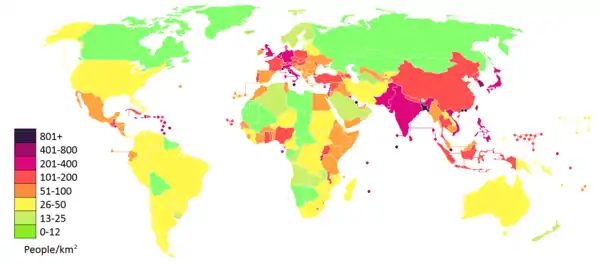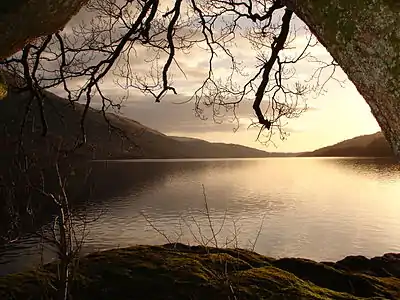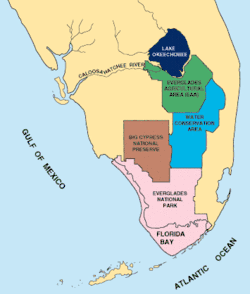Portal:Environment
| Portal | WikiProject Environment | Talk page |
Introduction Land management has preserved the natural characteristics of Hopetoun Falls, Australia while allowing ample access for visitors. The natural environment or natural world encompasses all living and non-living things occurring naturally, meaning in this case not artificial. The term is most often applied to the Earth or some parts of Earth. This environment encompasses the interaction of all living species, climate, weather and natural resources that affect human survival and economic activity. The concept of the natural environment can be distinguished as components:
In contrast to the natural environment is the built environment. Built environments are where humans have fundamentally transformed landscapes such as urban settings and agricultural land conversion, the natural environment is greatly changed into a simplified human environment. Even acts which seem less extreme, such as building a mud hut or a photovoltaic system in the desert, the modified environment becomes an artificial one. Though many animals build things to provide a better environment for themselves, they are not human, hence beaver dams, and the works of mound-building termites, are thought of as natural. (Full article...) A biophysical environment is a biotic and abiotic surrounding of an organism or population, and consequently includes the factors that have an influence in their survival, development, and evolution. A biophysical environment can vary in scale from microscopic to global in extent. It can also be subdivided according to its attributes. Examples include the marine environment, the atmospheric environment and the terrestrial environment. The number of biophysical environments is countless, given that each living organism has its own environment. The term environment can refer to a singular global environment in relation to humanity, or a local biophysical environment, e.g. the UK's Environment Agency. (Full article...) Selected article -
Rainforests are characterized by a closed and continuous tree canopy, moisture-dependent vegetation, the presence of epiphytes and lianas and the absence of wildfire. Rainforest can be classified as tropical rainforest or temperate rainforest, but other types have been described. Estimates vary from 40% to 75% of all biotic species being indigenous to the rainforests. There may be many millions of species of plants, insects and microorganisms still undiscovered in tropical rainforests. Tropical rainforests have been called the "jewels of the Earth" and the "world's largest pharmacy", because over one quarter of natural medicines have been discovered there. (Full article...)Did you know (auto-generated) -
Selected image - Map of countries by population density.
Current eventsNews
Selected biography -
Gro Brundtland (Norwegian pronunciation: [ˈɡruː ˈhɑ̀ːlɛm ˈbrʉ̀ntlɑnː]; born Gro Harlem, 20 April 1939) is a Norwegian politician (Arbeiderpartiet), who served three terms as the 29th Prime Minister of Norway (1981, 1986–1989, and 1990–1996) and as the director-general of the World Health Organization from 1998 to 2003. She is also known for having chaired the Brundtland Commission which presented the Brundtland Report on sustainable development. Educated as a physician, Brundtland joined the Labour Party and entered the government in 1974 as Minister of the Environment. She became the first female Prime Minister of Norway on 4 February 1981, but left office on 14 October 1981; she returned as Prime Minister on 9 May 1986 and served until 16 October 1989. She finally returned for her third term on 3 November 1990. From 1981 to 1992 she was leader of the Labour Party. After her surprise resignation as Prime Minister in 1996, she became an international leader in sustainable development and public health, and served as Director-General of the World Health Organization and as UN Special Envoy on Climate Change from 2007 to 2010. She is also deputy chair of The Elders and a former vice-president of Socialist International. Brundtland belonged to the moderate wing of her party and supported Norwegian membership in the European Union during the 1994 referendum. As Prime Minister Brundtland became widely known as the "mother of the nation." Brundtland received the 1994 Charlemagne Prize, and has received many other awards and recognitions. (Full article...)Selected organization -.svg.png.webp) National ecological surplus or deficit, measured as a country's biocapacity per person (in global hectares) minus its ecological footprint per person (also in global hectares). Data from 2013.
General images -The following are images from various environment-related articles on Wikipedia.
Selected quote -More did you know - Incandescent light bulb
Main topicsRelated articlesThings you can do
Related categories
Related portalsWikiProjects
Associated WikimediaThe following Wikimedia Foundation sister projects provide more on this subject:
Discover Wikipedia using portals
| |||||||||||||||


.jpg.webp)


.jpg.webp)
_18.jpg.webp)






.jpg.webp)
_peeking_from_a_leaf_hole_of_an_Alnus_nepalensis_tree_(cropped).jpg.webp)

.jpg.webp)

.jpg.webp)
















.jpg.webp)




.jpg.webp)










.JPG.webp)






.jpg.webp)








